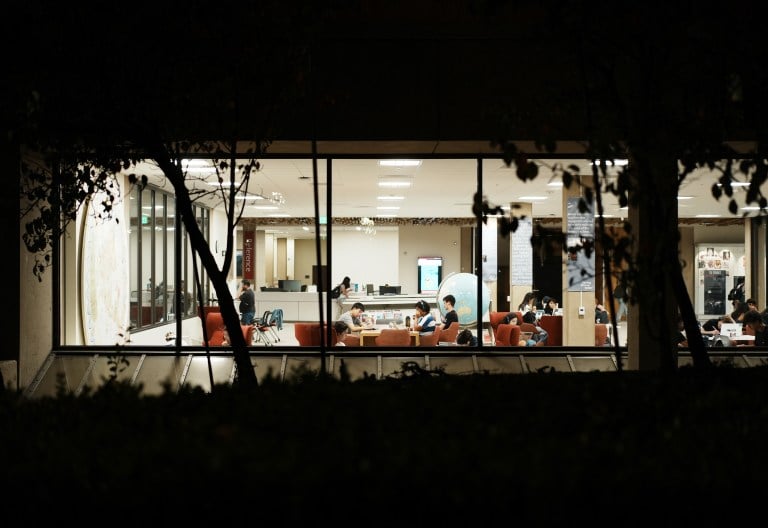Despite promises of a 24-hour Green Library study space starting this quarter, staffing delays have prevented this from becoming a reality. Alexis Manheim, the associate university librarian for technical and access services, said she is “hopeful” that something can be up and running by the end of fall.
The plan came after the University accepted a three-year trial of new late night hours, supported by a student survey and formal resolution presented by Undergraduate Senators Ivy Chen ’26 and Gordon Allen ’26 last May. The transition is being funded by a special grant from the University nearing a million dollars for the 2024-2025 school year.
The Daily has reached out to the University for comment.
To prepare for the change, the library installed a rolling shutter door to block students from accessing the staircase to other areas in the library past midnight. This would leave only Green Library’s Hohbach Hall — the first-floor space facing Meyer Green — available for students past midnight from Sunday through Thursday.
The remaining hurdle to opening is hiring two full-time librarians to oversee the space from midnight to 8 a.m.
According to Manheim, the library has been seeking new hires for the role since June, but extra scrutiny of the candidates has lengthened the process, which is currently in the interview stage.
“What you don’t want to do is rush hiring and then have to close back down [a couple weeks later] because they don’t want to do the work anymore,” Allen said.
The librarians will oversee the nightly functioning of the space and provide resource help to students. But, as library stacks will be inaccessible, circulation will effectively close after midnight, apart from specially reserved books available at the counter.
Chen and Allen hope that demonstrated demand will legitimize their desire for a security guard to supervise during late-night hours upon opening. Yet there are currently no arrangements for security, Chen said. However, Stanford University Department of Public Safety (SUDPS) was in the process of hiring security staff, Manheim said.
The Daily reached out to SUDPS for confirmation.
The senators believe the space will provide a valuable late-night alternative to other current options like Old Union, which closes at 2 a.m., and the 24-hour study room in Lathrop. Allen compared the latter to a “bland sort of hospital” far away from where students live, while he felt Green Library was “cozy.”
Hohbach Hall provides 155 seats in addition to “two group study rooms, 12 sit-stand desks with monitors and four study corner setups (with monitors, desks and seating) in the central glassed-in presentation room,” according to Manheim. Additionally, during the last two weeks of the quarter, the hours will extend to 24/7, including both Friday and Saturday nights, in anticipation of students preparing for finals.
Demand for the space at night remains uncertain. According to Manheim, Green Library currently sees a drop off in attendance around 11 p.m., this could be because people moved elsewhere, knowing the building is about to close. She said the library will observe usage continuously, and that upticks in attendance may be delayed as student study habits take time to update.
While the 24-hour space has yet to open, Chen and Allen look forward to its implementation. The duo, who are a year deep into the project, hope to have a grand opening party with food and drinks supplied by Coupa Cafe or On Call.
In response to the delay, which has faced scrutiny by students on social media app Fizz, Allen and Chen “apologize very much,” saying they’ve nudged the administration and “emphasized the need to speed up [librarian] recruitment.”
As they wait on administration to fully implement the plan, the senators reiterated that the longevity of the extended hours will depend on utilization.
“We actually want people to come and prove that the statistics justify why this is all happening, and why we should advocate for the entire library … to actually extend 24/7,” Chen said.
